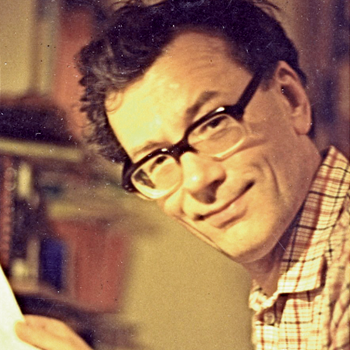Kronid Arkadyevich Lyubarsky was a prominent human rights activist whose work led to his incarceration, jailing and emigration in the 1970s. During his years in exile, he published a human rights bulletin, News from the USSR, and an annual list of political prisoners in the labour camps, prisons and mental hospitals of the Soviet Union. Following the 1991 breakup of the USSR, he returned to Russia, where he served as chairman of a human rights organisation, the Moscow Helsinki Group, and as deputy editor-in-chief of Novoye Vremya, a pro-democracy magazine.
Born in the city of Pskov, Russia, on April 4, 1934, Lyubarsky graduated from Moscow University in 1956 and then worked at the All-Union Institute of Scientific and Technical Information of the USSR Academy of Sciences. He became active in his country’s civil rights movement in the mid-1960s and was an important publisher of samizdat (underground) publications, including the famous Chronicle of Current Events.
On January 14, 1972, police ransacked his apartment and confiscated more than 600 documents, manuscripts and books. Three days later, he was arrested on charges of anti-Soviet agitation and propaganda.
Convicted in October 1972, Lyubarsky spent the next five years in various labour camps and prisons, but he remained unbroken. A talented organiser, he initiated the idea of celebrating a Political Prisoners’ Resistance Day while he was still in camp. The initiative spread quickly to other camps and prisons, and to this day October 30 is observed in Russia as Soviet Political Prisoners’ Day.
After his release, Lyubarsky fought the Soviet regime with renewed vigour. During this period, he was one of the managers of a fund set up by the writer Alexander Solzhenitsyn to aid political prisoners and a member of the Soviet branch of Amnesty International. However, mounting pressures by the authorities and the imminent threat of his renewed arrest forced Lyubarsky and his family to go into exile. Stripped of his citizenship, he sought political asylum in West Germany, where he continued his human rights activities.
In Munich, Lyubarsky founded a bulletin, News from the USSR, the only periodical providing objective and comprehensive information about the situation of human rights and resistance to the Communist regime in the Soviet Union. Published in Russian and English twice a month, this unique bulletin also carried an annual “List of Political Prisoners in the USSR.” The list appeared until 1989, when the last Soviet political prisoner was released, and was widely used for reference by private citizens, human rights organisations and numerous parliamentary commissions, as well as the U.S. Congress.
Beginning in 1984, Lyubarsky also edited and published the magazine Strana i Mir (The Country and the World). Taking its name from a well-known book by the political dissident and Nobel laureate, Andrei D. Sakharov, the magazine was intended for a broad readership. It reported not only on repression and resistance in the USSR but also economic and political developments in the rest of the world. Many works by prominent Western politicians, writers, historians and intellectuals appeared in Russian for the first time in its pages.
Lyubarsky returned to Russia following the breakup of the USSR and became a Russian citizen on June 2, 1992. He was one of the authors of the country’s new constitution and drafted a number of its articles, including those on the right to freedom of movement and residence within the borders of his country. He also served on the editorial staff of a number of magazines, including the Russian Civil Rights Bulletin, as well as led the Moscow Helsinki Group.
In February 1993, he joined the magazine Novoye Vremya (New Times), where he was appointed first deputy editor-in-chief. There, he wrote brilliant articles in defence of democracy and human rights and against the war in Chechnya.
“Owing to his unblemished reputation, journalistic talent, encyclopedic knowledge and polemical skill, each of his articles was an important event,” wrote the staff of Novoye Vremya after Lyubarsky died of a heart attack on May 23, 1996, while vacationing in Indonesia.



